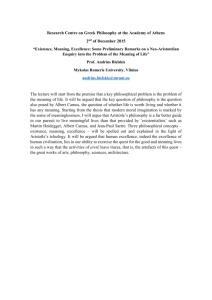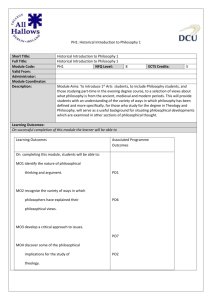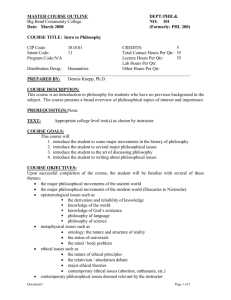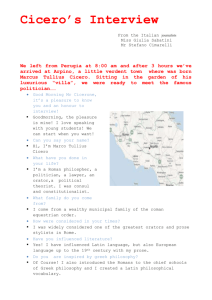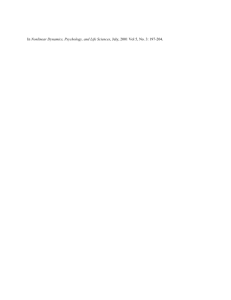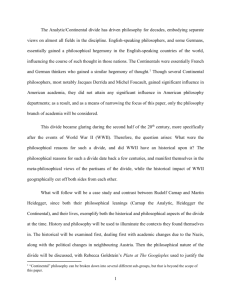click for document
advertisement
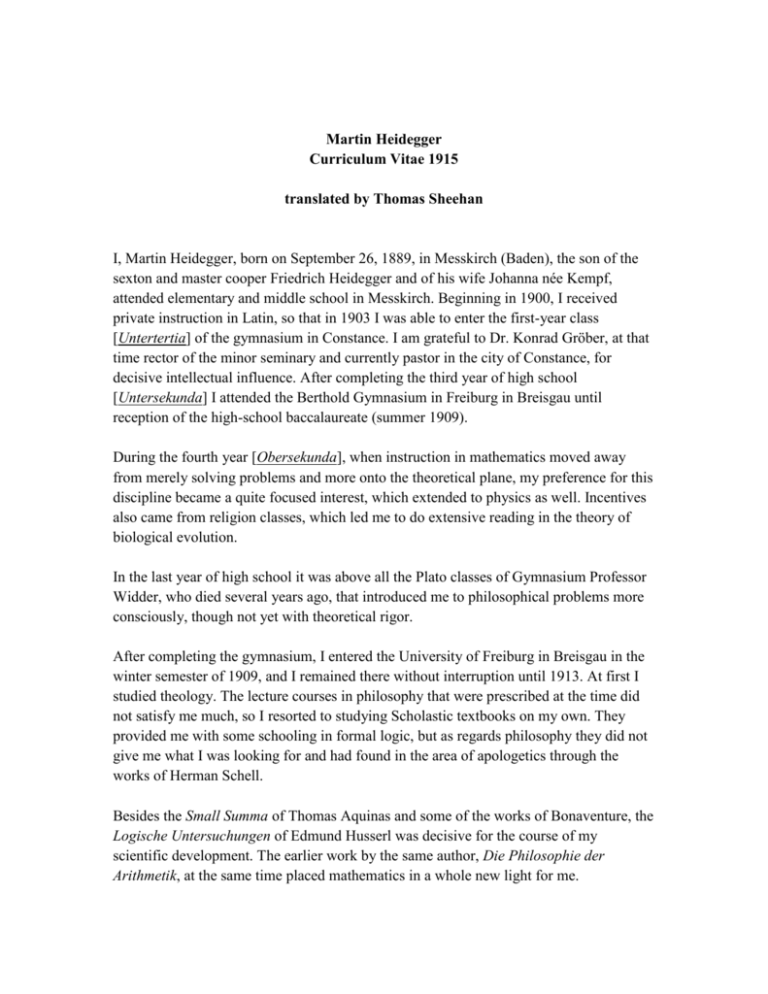
Martin Heidegger Curriculum Vitae 1915 translated by Thomas Sheehan I, Martin Heidegger, born on September 26, 1889, in Messkirch (Baden), the son of the sexton and master cooper Friedrich Heidegger and of his wife Johanna née Kempf, attended elementary and middle school in Messkirch. Beginning in 1900, I received private instruction in Latin, so that in 1903 I was able to enter the first-year class [Untertertia] of the gymnasium in Constance. I am grateful to Dr. Konrad Gröber, at that time rector of the minor seminary and currently pastor in the city of Constance, for decisive intellectual influence. After completing the third year of high school [Untersekunda] I attended the Berthold Gymnasium in Freiburg in Breisgau until reception of the high-school baccalaureate (summer 1909). During the fourth year [Obersekunda], when instruction in mathematics moved away from merely solving problems and more onto the theoretical plane, my preference for this discipline became a quite focused interest, which extended to physics as well. Incentives also came from religion classes, which led me to do extensive reading in the theory of biological evolution. In the last year of high school it was above all the Plato classes of Gymnasium Professor Widder, who died several years ago, that introduced me to philosophical problems more consciously, though not yet with theoretical rigor. After completing the gymnasium, I entered the University of Freiburg in Breisgau in the winter semester of 1909, and I remained there without interruption until 1913. At first I studied theology. The lecture courses in philosophy that were prescribed at the time did not satisfy me much, so I resorted to studying Scholastic textbooks on my own. They provided me with some schooling in formal logic, but as regards philosophy they did not give me what I was looking for and had found in the area of apologetics through the works of Herman Schell. Besides the Small Summa of Thomas Aquinas and some of the works of Bonaventure, the Logische Untersuchungen of Edmund Husserl was decisive for the course of my scientific development. The earlier work by the same author, Die Philosophie der Arithmetik, at the same time placed mathematics in a whole new light for me. After three semesters, my intense engagement with philosophical problems, along with the tasks of my own professional studies [in theology], resulted in severe exhaustion. My heart trouble, which had come about earlier from playing too much sports, broke out so severely that any later employment in the service of the church was taken to be extremely questionable. Therefore in the winter semester of 1911-1912 I enrolled in the Department of Natural Sciences and Mathematics. My philosophical interest was not lessened by the study of mathematics. On the contrary, since I no longer had to follow the compulsory lecture courses in philosophy, I could attend a larger number of lecture courses in philosophy and above all could take part in the seminar exercises conducted by Privy Councillor Rickert. In this new school I learned first and foremost to understand philosophical problems as problems, and I acquired insight into the essence of logic, the philosophical discipline that still interests me the most. At the same time I acquired a correct understanding of recent philosophy from Kant onward, a matter that I found sparsely and inadequately treated in the Scholastic literature. My basic philosophical convictions remained those of Aristotelian-Scholastic philosophy. With time I recognized that the intellectual wealth stored up in it must permit of -- indeed, demands -- a far more fruitful exploitation and utilization. Therefore, in my dissertation on Die Lehre vom Urteil im Psychologismus, I took my bearings both from modern logic and from basic Aristotelian-Scholastic premises and sought to find a basis there for further investigations of a central problem of logic and epistemology. On the basis of this work, I was allowed by the Philosophical Faculty of Freiburg University to take the oral examination for the doctorate, which I passed on July 26, 1913. As a result of my study of Fichte and Hegel, my intense engagement with Rickert's Die Grenzen der naturwissenschachaftlichen Begriffsbildung, the investigations of Dilthey, and not least of all lecture courses and seminar exercises with Privy Councillor Finke, my aversion to history, which had been nurtured in me by my predilection for mathematics, was thoroughly destroyed. I recognized that philosophy should not be oriented onesidedly either to mathematics and natural science or to history, but that the latter, precisely as the history of the human spirit [Geistesgeschichte], can fructify philosophy to a far greater degree. My increasing interest in history facilitated for me a more intense engagement with the philosophy of the Middle Ages, an engagement that I recognized as necessary for a radical extension of Scholasticism. For me this engagement consists not primarily in a presentation of the historical relations between individual thinkers, but rather in an interpretative understanding of the theoretical content of their philosophy with the means provided by modern philosophy. This resulted in my investigation into Die Kategorienund Bedeutungslehre des Duns Scotus. This investigation has also engendered in me the plan for a comprehensive presentation of medieval logic and psychology in the light of modern phenomenology, together with a consideration of the historical position of individual medieval thinkers. If I am permitted to assume the duties of scientific research and teaching, my life's work will be dedicated to the realization of this plan.




